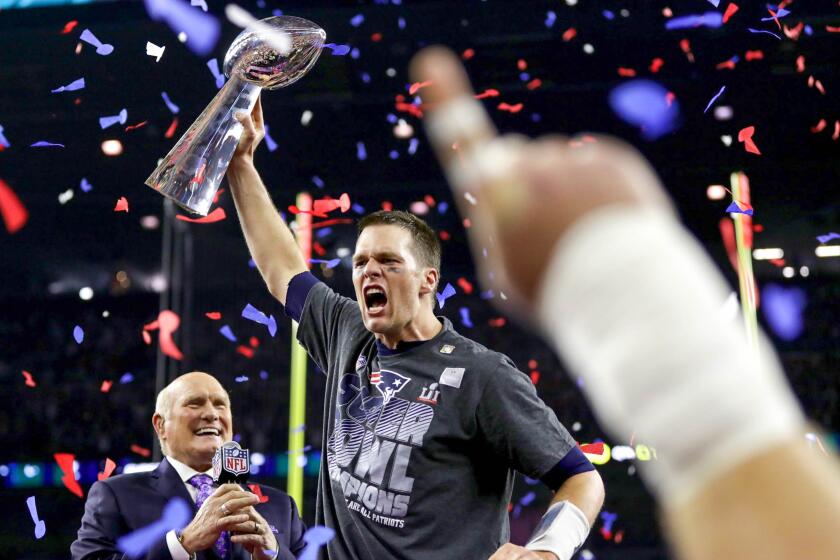In vote, can Cal touch ‘em all?
- Share via
BALTIMORE — Cal Ripken Jr. is a virtual lock to gain first-ballot entry into the Hall of Fame when the results are announced Tuesday.
The real question is: Is the feeling unanimous? No player has received 100% of the vote. But no one has had a career quite like that of Cal Ripken Jr., either.
“He’s got a shot,” Hall of Fame member Brooks Robinson said. “It’s a longshot, but it’s going to be interesting.”
Ripken put up plenty of dazzling numbers during his sensational 21-year career, all with the Baltimore Orioles. He played in 2,632 consecutive games, tallied 3,184 hits, hit 431 home runs, won two most-valuable-player awards and appeared in 19 All-Star games.
Now, five years after his retirement, he has a chance to accumulate yet another eye-opening number for his Hall of Fame plaque: 100, as in the percentage of votes received for entry into baseball’s shrine.
Since the Baseball Writers’ Assn. of America began voting for Hall of Fame entrants by ushering in the inaugural class of Ty Cobb, Babe Ruth, Walter Johnson, Christy Mathewson and Honus Wagner in 1936, no player has received 100% of the vote.
Each year, more than 500 eligible BBWAA members receive a ballot filled with around two dozen possibilities. Only a few players actually receive votes.
“History tells us that he’s not going to be unanimous because nobody’s ever unanimous. Until somebody is, my gut feeling is it won’t happen that way,” said Peter Schmuck, a baseball writer for the (Baltimore) Sun and a former BBWAA chapter president.
It’s hard to imagine a candidate more worthy than Ripken, a player who respected and honored the game. The son of a lifelong baseball man, Ripken never asked or wanted a day off. He was a 6-foot-4 power-hitting shortstop, one who redefined a position manned previously by diminutive slap-hitters.
Some say Ripken saved baseball in September 1995, with his impromptu feel-good lap around Camden Yards after he broke Lou Gehrig’s record of playing in 2,130 consecutive games. Ripken’s march to 2,131 that season displayed what was right about a game that had been staggered a year earlier by a bitter labor dispute that forced cancellation of the World Series.
“I know the criteria to be a Hall of Famer,” Robinson said, “and Cal is every one of those things.”
The closest anyone has come to receiving 100% of the vote is Tom Seaver, who was on 425 of 430 ballots to earn 98.84% in 1992.
Nolan Ryan ranks second with 98.79%, in 1999, followed by Ty Cobb (98.23 in 1936). Babe Ruth is ninth with 95.13%, which says a lot about the chances Ripken has of earning unanimous selection. If 11 writers felt inclined to leave Ruth off their ballot in 1936, it’s not difficult to imagine at least one person failing to check the box next to Ripken’s name.
“No one ever gets 100%. It’s been a tradition, so I suspect that will probably remain true,” said Mike Flanagan, a former teammate of Ripken’s and now the Orioles’ executive vice president for baseball operations. “However, I don’t know what criteria you could use to decide not to vote for him.”
Hall of Fame pitcher Jim Palmer said: “I suppose it’s always possible that it could be unanimous. I know this much: If he doesn’t get at least 77% of the vote, they will have to administer a drug test to all the writers.”
Palmer, a three-time Cy Young Award winner with the Orioles, gained entry to the Hall in 1990 with 92.6% (411 of 444 ballots). Robinson got 91.98% (344-374).
“We are very pleased with the job the BBWAA has done over the years,” said Jeff Idelson, Hall of Fame vice president for communications and education. “Why has there never been a unanimous selection? Because it is inherently a democratic process in which each participant has to make an arbitrary decision.”
Joe DiMaggio didn’t even get in on the first ballot. So how can Ripken possibly garner 100%?
“The voting has evolved, which explains why Tom Seaver is the highest vote-getter by percentage,” Schmuck said. “I don’t think that anyone would say that Tom Seaver is the No. 1 greatest pitcher that ever lived. It’s a function of how the voting has changed. So if anybody has a chance to be unanimous or close to it -- or for that matter just to exceed Tom Seaver’s vote total -- I think it’s Cal Ripken.”
Seaver won 311 games, three Cy Young Awards and finished with a 2.86 earned-run average. Decent numbers, but not nearly as impressive as Ripken’s -- beginning with 2,632.
Ripken often has said he doesn’t care how many votes he receives. What matters is being a part of the Hall.
“The beauty of the game, in my opinion, is its players and its former players. That tells the story and that celebrates the game,” Ripken said in August. “And if you can add to that, if you can join that group, that’s a very special honor.”
More to Read
Go beyond the scoreboard
Get the latest on L.A.'s teams in the daily Sports Report newsletter.
You may occasionally receive promotional content from the Los Angeles Times.










